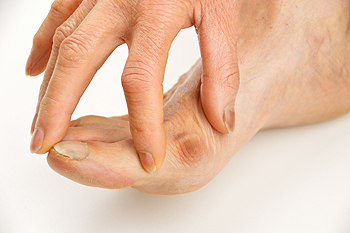 A bunion is a bony bump that forms on the joint at the base of the big toe, causing it to deviate towards the other toes. This condition, known as hallux valgus, can result from genetic predisposition, wearing tight or narrow shoes, arthritis, or stress on the foot. Symptoms include pain, swelling, redness, and difficulty in walking. Additionally, the skin over the bunion may gradually become thickened and tender. Diagnosis typically involves a physical examination and X-rays to assess the severity and underlying bone structure. Treatment options range from conservative methods such as wearing wider shoes, using orthotic devices, and taking anti-inflammatory medications, to more invasive procedures like bunion surgery for severe cases. Untreated bunions can lead to complications such as chronic pain, bursitis, hammertoe, and difficulty finding comfortable footwear. If you have a bunion that is causing you discomfort, it is suggested that you schedule an appointment with a podiatrist for a tailored treatment plan.
A bunion is a bony bump that forms on the joint at the base of the big toe, causing it to deviate towards the other toes. This condition, known as hallux valgus, can result from genetic predisposition, wearing tight or narrow shoes, arthritis, or stress on the foot. Symptoms include pain, swelling, redness, and difficulty in walking. Additionally, the skin over the bunion may gradually become thickened and tender. Diagnosis typically involves a physical examination and X-rays to assess the severity and underlying bone structure. Treatment options range from conservative methods such as wearing wider shoes, using orthotic devices, and taking anti-inflammatory medications, to more invasive procedures like bunion surgery for severe cases. Untreated bunions can lead to complications such as chronic pain, bursitis, hammertoe, and difficulty finding comfortable footwear. If you have a bunion that is causing you discomfort, it is suggested that you schedule an appointment with a podiatrist for a tailored treatment plan.
If you are suffering from bunions, contact Darron Barrus, DPM of Shelby Podiatry. Our doctor can provide the care you need to keep you pain-free and on your feet.
What Is a Bunion?
A bunion is formed of swollen tissue or an enlargement of boney growth, usually located at the base joint of the toe that connects to the foot. The swelling occurs due to the bones in the big toe shifting inward, which impacts the other toes of the foot. This causes the area around the base of the big toe to become inflamed and painful.
Why Do Bunions Form?
Genetics – Susceptibility to bunions are often hereditary
Stress on the feet – Poorly fitted and uncomfortable footwear that places stress on feet, such as heels, can worsen existing bunions
How Are Bunions Diagnosed?
Doctors often perform two tests – blood tests and x-rays – when trying to diagnose bunions, especially in the early stages of development. Blood tests help determine if the foot pain is being caused by something else, such as arthritis, while x-rays provide a clear picture of your bone structure to your doctor.
How Are Bunions Treated?
- Refrain from wearing heels or similar shoes that cause discomfort
- Select wider shoes that can provide more comfort and reduce pain
- Anti-inflammatory and pain management drugs
- Orthotics or foot inserts
- Surgery
If you have any questions, please feel free to contact our office located in Alabaster, AL . We offer the newest diagnostic and treatment technologies for all your foot care needs.
